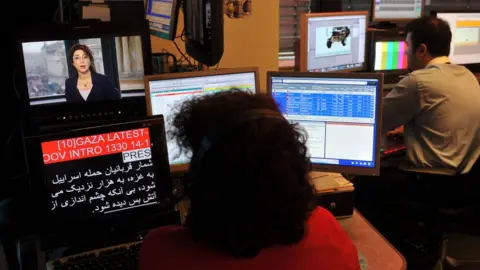BBC accuses Iran of escalating harassment of Persian journalists
 BBC
BBCThe BBC has filed an urgent complaint to the UN over what it says is Iran's ongoing harassment of journalists at its Persian service and their families.
It comes amid escalating security concerns, after a year in which Iran has been accused of conducting unlawful operations against journalists abroad.
BBC World Service Director Liliane Landor said staff faced asset freezes, online harassment and death threats.
"It must stop," she told a conference on media freedom in Estonia.
The Iranian government has previously denied the allegations, and accused the BBC of spreading false information to encourage its overthrow.
BBC News Persian reaches a weekly global audience of almost 22 million people, including around 13 million in Iran, where the service is banned.
A BBC statement said Iran had targeted BBC News Persian journalists and their families for more than a decade.
Journalists had not been able to return to Iran for fear of arrest, while family members had been subjected to travel bans, interrogated and arbitrarily detained, it added.
The new complaint filed to the UN, which is based on interviews with staff members about incidents in the last year, reported:
- Increased security concerns for BBC News Persian journalists in the light of extra-territorial threats, including in the UK and in third countries
- Increased harassment of family members in Iran
- Increased financial pressure from the ongoing asset freeze that penalises the journalists and their extended families
- Increased intelligence and counter-intelligence activity aimed at undermining the professional reputation of BBC News Persian and its journalists
- Increased and continued online attacks and online violence, particularly directed at women journalists
Caoilfhionn Gallagher QC and Jennifer Robinson of Doughty Street Chambers, Counsel for the BBC World Service, said: "We know from Iran's past actions that it is willing to take cross-border and deadly action to silence its critics, and that it perceives independent journalism about Iran as a risk to its power.
"Our clients from BBC News Persian receive threats of death and violence simply for doing their jobs - simply for being journalists. We call on the United Nations experts and the Human Rights Council to take swift, robust action to hold Iran to account and ensure that BBC News Persian journalists can report without fear," they added.
The UN's secretary general and its special rapporteurs have previously raised concerns about Iran's treatment of BBC staff and warned that harassment, surveillance and death threats violate international human rights law.
